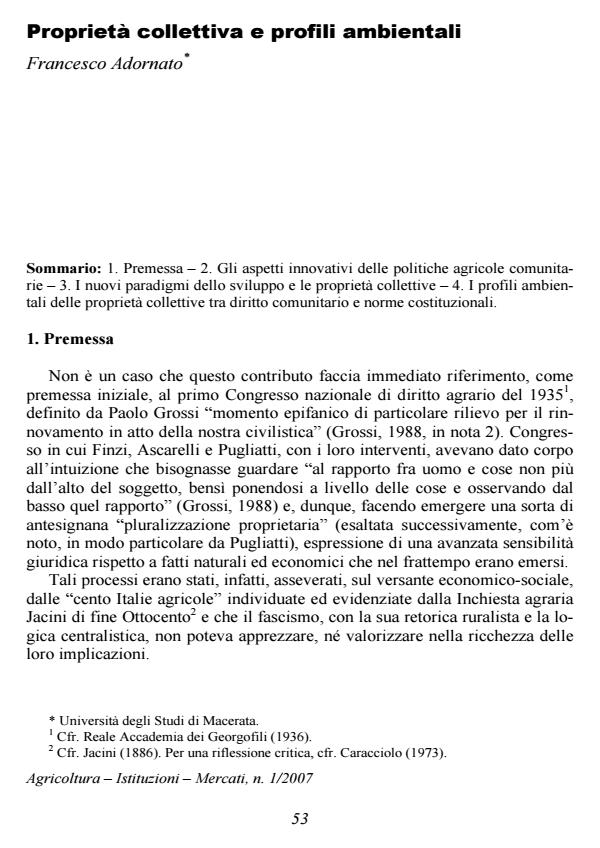Proprietà collettiva e profili ambientali
Journal title AGRICOLTURA ISTITUZIONI MERCATI
Author/s Francesco Adornato
Publishing Year 2007 Issue 2007/1
Language Italian Pages 12 P. 53-64 File size 57 KB
DOI
DOI is like a bar code for intellectual property: to have more infomation
click here
Below, you can see the article first page
If you want to buy this article in PDF format, you can do it, following the instructions to buy download credits

FrancoAngeli is member of Publishers International Linking Association, Inc (PILA), a not-for-profit association which run the CrossRef service enabling links to and from online scholarly content.
The author confronts the theme of the collective property, analysing in particular its environmental aspects. The analysis starts from an exam of common agricultural policies and, specifically, regulation 1782/2003 on the so called mid term reform of the Cap and regulation 1698/2005 on rural development. A new model of statuality founded, on one hand, on policentrism of the sources and, on the other hand, on the principle of subsidiariety and connoted by territorial specificity emerges from these regulations, and allows the designing of agricultural policies that are more articulated and adherent to the needs of the member states. It is precisely with regards to this new approach of the Common agricultural policy that we can appreciate the strategic role that, in a dimension of eco-compatible development, collective properties, and in particular forestal ones, can have (see article 49 regulation no 1698/2005). At a national level, the productive and environmental recovery of collective properties (in this new context of sustainable development and social cohesion) finds constitutional support in articles 43 and 44 of the constitution. These can be interpreted innovatively and coherenty with both national and community law. On the other hand, the new formulation of article 2135 of the civil code eliminates all doubt about the possibility for the agricultural entrepreneur to undertake activities aimed at the provision of services through the prevalent use of the enterprise’s equipment or resources normally employed in the agricultural activity exercised. Article 39 of regulation 1698/2005 specifies that agro-environmental payments can be made also to other land managers, as well as farmers, when this is justified by the achievement of environmental objectives. In conclusion, it is codified that communities that own collective lands can provide, in a lucrative way, environmental services. Communities that own collective lands conveniently usable as woodlands and permanent farmlands through the representative authority of its inhabitants and in one of the juridical forms identified by the current rules, receive from community law, in accordance with their own national discipline, instruments and support (prescriptive and financial) to start new processes of development.
Francesco Adornato, Proprietà collettiva e profili ambientali in "AGRICOLTURA ISTITUZIONI MERCATI " 1/2007, pp 53-64, DOI: